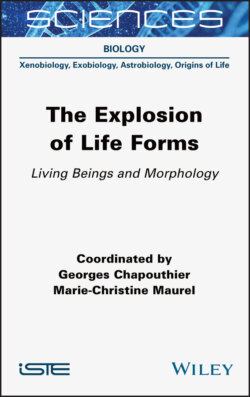Читать книгу The Explosion of Life Forms - Группа авторов - Страница 22
2.1. Observations and assumptions
ОглавлениеMaybe asking about life’s “essence” is, however, already the wrong question. In traditional philosophical terms, asking about the essence of something aims at finding out its “formal cause”, a concept not in use in modern science. It only eventually plays a role when it comes to the idea of “information”. For Aristotle’s philosophy, every life even has some sort of soul, which also involves another, final cause or purpose for an object in the world (Bedau and Cleland 2010, p. 4). Although this is distinct from the widespread bodiless concept of soul advocated by René Descartes, the whole idea behind it does not fit into modern science anymore. When we ask about the nature of something, like in this very short essay, we want to know of the substance of something, not its purpose, which for Aristotle, in contrast, was also part of its nature. Physics and metaphysics were combined.
The idea of teleological or goal directed attributes of life has reappeared from time to time in the discussion. Immanuel Kant, for instance, was a very prominent proponent of the idea of teleology. Even Darwin seems to have made some use of his version of the concept, but only in his notebooks (Lennox 1993). More recently, but still before the dawn of mature Darwinism, embryologist Hans Driesch turned into a philosopher when postulating a vital force as being responsible for the possibility of two perfect embryos developing from an egg separated into two after the first cleavage division (Mayr 1982, p. 118).
The approach has been discarded by a vast majority of biologists, who are keen to point out that there is no entelechy at work which distinguishes life from non-life. Ernst Mayr, for instance, would acknowledge some sort of teleonomy in individuals, namely systems operating based on a program of coded information (Mayr 1965, p. 42), but “there is no evidence that would support teleology in the sense of various vitalistic or finalistic theories” (Mayr 1965, p. 43). I suppose those theories might be projections from how we ourselves perceive the world as assumingly willful beings.
Although the Aristotelian world view has been an empirical approach, its conclusions were extrapolations from how things appeared to us, from our own observations. Reality can be trickier than that and we sometimes must leave our own point of view: to understand that the sun does not revolve around Earth, for instance, although observationally it may at first look like it when it rises and sets. Only more careful observations of the celestial constellations made the emergence of the heliocentric world view possible, even before we could leave our Earthbound perspective behind.
Our culture is also influenced by its religious context. The theological idea of a Divine breath of life animating bodies (Gen 2:7; Ps 104:29f) and granting the ability to live may be in part another observation-based approach which fails. We observe that when a human’s or animal’s breathing ends, it is dead, so the invisible breath seems to constitute the difference. An apparently invisible force is associated here with the Divine.
This may remind us that our language carries with it a certain world-view and tradition and we must be cautious about the words we use and sometimes question their traditional annotations. We know today that the observation of all life performing breathing or even just requiring air in a strict sense is certainly wrong, as life must have already emerged in an environment when there was no oxygen-rich atmosphere on Earth (Catling 2013, p. 32). Yet some ideas of religious thinkers might also prove helpful to develop science. The whole idea of evolution, for instance, is associated with the idea of a linear development and progress typical for the Judeo-Christian tradition, for instance (Lazcano 2017a, p. 311). Likewise, metabolism as a more general approximation to the concept of the breath of life is probably a justified observation to stick to.
